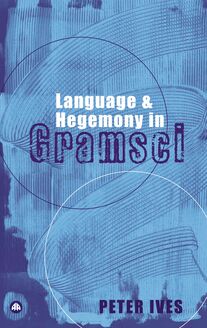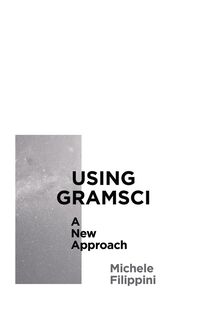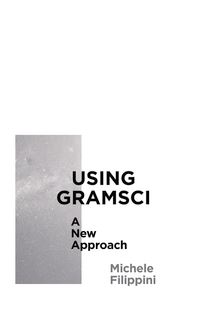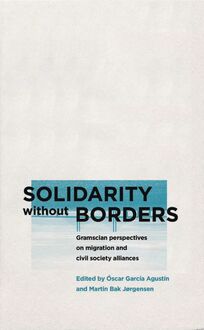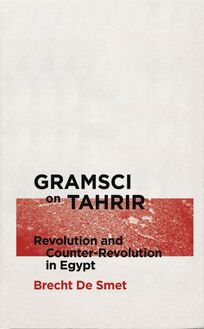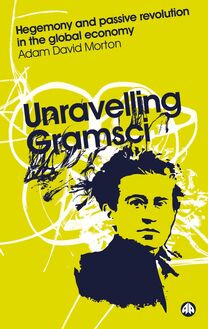-
 Univers
Univers
-
 Ebooks
Ebooks
-
 Livres audio
Livres audio
-
 Presse
Presse
-
 Podcasts
Podcasts
-
 BD
BD
-
 Documents
Documents
-
- Cours
- Révisions
- Ressources pédagogiques
- Sciences de l’éducation
- Manuels scolaires
- Langues
- Travaux de classe
- Annales de BEP
- Etudes supérieures
- Maternelle et primaire
- Fiches de lecture
- Orientation scolaire
- Méthodologie
- Corrigés de devoir
- Annales d’examens et concours
- Annales du bac
- Annales du brevet
- Rapports de stage
La lecture à portée de main
Vous pourrez modifier la taille du texte de cet ouvrage
Découvre YouScribe en t'inscrivant gratuitement
Je m'inscrisDécouvre YouScribe en t'inscrivant gratuitement
Je m'inscrisEn savoir plus
Vous pourrez modifier la taille du texte de cet ouvrage
En savoir plus

Description
This book argues for Gramsci’s theory of the formation of a transnational counter-hegemonic bloc, by studying methods of modern resistance and new forms of solidarity between these forming groups. With case studies of the Gezi Park Protests in Turkey, social movements in Ireland and the Lampedusa in Hamburg, the authors consider how diverse new migrant political actors, newfound cross-border alliances, and spaces of resistance shape the political dimensions of protest.
As migrants are often deprived of agency and placed outside the mobilisations taking place across Europe, Solidarity without Borders demonstrates how new solidarity relations are shaped and how these may construct a new common ground for struggle and for developing political alternatives.
Series Preface
Preface and Acknowledgements
Introduction
1. Solidarity without Borders: Gramscian Perspectives on Migration and Civil Society Alliances - Óscar Garcia Agustín and Martin Bak Jørgensen
Part I: The Heterogeneity of Political Actors
2. Gramsci’s 'Philosophy of Praxis' and the Topic of Migration - Ursula Apitzsch
3: Countering Hegemony through a Park - Nazl enses and K vanç Özcan
4. Gramsci in Slices: Race, Colonialism, Migration and the Postcolonial Gramsci - Miguel Mellino
Part II: Solidarity and Alliances
5. Political and Social Alliances: Gramsci and Today - Derek Boothman
6. Gramsci, Migrants and Trade Unions: An Irish Case Study - Mary Hyland and Ronald Munck
7. The Southern Question and the Irish Question: A Social Movement Perspective - Laurence Cox
Part III: Avoiding Misplaced Alliances
8. Hegemony, Migration and Misplaced Alliances: Lessons from Gramsci - Peter Mayo
9. For the Sake of Workers but Not Immigrants Workers? Social Dumping and Free Movement - Óscar García Agustín and Martin Bak Jørgensen
Part IV: Spaces of Resistance
10. Politicising the Crisis: The Southern Question, Uneven Geographies and the Construction of Solidarity - David Featherstone
11. Contesting Urban Management Regimes: The Rise of Urban Justice Movements in Sweden - Lisa Kings, Aleksandra Ålund and Nazem Tahvilzadeh
12. Spaces of Resistance and Re-Actuality of Gramsci in Refugees’ Struggles for Rights? The ‘Lampedusa In Hamburg’ between Exit and Voice - Susi Meret and Elisabetta Della Corte
Conclusion
13. Against Pessimism: A Time and Space for Solidarity - Óscar Garcia Agustín and Martin Bak Jørgensen
Contributors
Index
Sujets
Informations
| Publié par | Pluto Press |
| Date de parution | 20 février 2016 |
| Nombre de lectures | 0 |
| EAN13 | 9781783717620 |
| Langue | English |
Informations légales : prix de location à la page 0,1650€. Cette information est donnée uniquement à titre indicatif conformément à la législation en vigueur.
Extrait
Solidarity without Borders
Reading Gramsci
General Editors:
Peter Ives, Professor of Politics, University of Winnipeg
and
Adam David Morton, Professor of Political Economy,
University of Sydney
Also available
Gramsci, Culture and Anthropology
An Introductory Text
Kate Crehan
Language and Hegemony in Gramsci
Peter Ives
Unravelling Gramsci:
Hegemony and Passive Revolution in
the Global Political Economy
Adam David Morton
Subalternity, Antagonism, Autonomy:
Constructing the Political Subject
Massimo Modonesi
Translated by
Adriana V. Rendón Garrido and Philip Roberts
Gramsci on Tahrir
Revolution and Counter-Revolution in Egypt
Brecht De Smet
Solidarity without Borders
Gramscian Perspectives on Migration and Civil Society Alliances
Edited by Óscar García Agustín and Martin Bak Jørgensen
First published 2016 by Pluto Press
345 Archway Road, London N6 5AA
www.plutobooks.com
Copyright © Óscar García Agustín and Martin Bak Jørgensen 2016
The right of the individual contributors to be identified as the authors of this work has been asserted by them in accordance with the Copyright, Designs and Patents Act 1988.
British Library Cataloguing in Publication Data
A catalogue record for this book is available from the British Library
ISBN 978 0 7453 3626 8 Hardback
ISBN 978 0 7453 3631 2 Paperback
ISBN 978 1 7837 1761 3 PDF eBook
ISBN 978 1 7837 1763 7 Kindle eBook
ISBN 978 1 7837 1762 0 EPUB eBook
This book is printed on paper suitable for recycling and made from fully managed and sustained forest sources. Logging, pulping and manufacturing processes are expected to conform to the environmental standards of the country of origin.
Typeset by Stanford DTP Services, Northampton, England
Simultaneously printed in the European Union and United States of America
Contents
Series Preface
Preface and Acknowledgements
INTRODUCTION
1. Solidarity without Borders: Gramscian Perspectives on Migration and Civil Society Alliances Óscar Garcia Agustín and Martin Bak Jørgensen
PART I: THE HETEROGENEITY OF POLITICAL ACTORS
2. Gramsci’s ‘Philosophy of Praxis’ and the Topic of Migration Ursula Apitzsch
3. Countering Hegemony through a Park: Gezi Protests in Turkey’s Migrant Neighbourhoods Nazlı Şenses and Kıvanç Özcan
4. Gramsci in Slices: Race, Colonialism, Migration and the Postcolonial Gramsci Miguel Mellino
PART II: SOLIDARITY AND ALLIANCES
5. Political and Social Alliances: Gramsci and Today Derek Boothman
6. Gramsci, Migrants and Trade Unions: An Irish Case Study Mary Hyland and Ronaldo Munck
7. The Southern Question and the Irish Question: A Social Movement Perspective Laurence Cox
PART III: AVOIDING MISPLACED ALLIANCES
8. Hegemony, Migration and Misplaced Alliances: Lessons from Gramsci Peter Mayo
9. For the Sake of Workers but Not Immigrants Workers? Social Dumping and Free Movement Óscar García Agustín and Martin Bak Jørgensen
PART IV: SPACES OF RESISTANCE
10. Politicising the Crisis: The Southern Question, Uneven Geographies and the Construction of Solidarity David Featherstone
11. Contesting Urban Management Regimes: The Rise of Urban Justice Movements in Sweden Lisa Kings, Aleksandra Ålund and Nazem Tahvilzadeh
12. Spaces of Resistance and Re-Actuality of Gramsci in Refugees’ Struggles for Rights? The ‘Lampedusa in Hamburg’ between Exit and Voice Susi Meret and Elisabetta Della Corte
CONCLUSION
13. Against Pessimism: A Time and Space for Solidarity Óscar Garcia Agustín and Martin Bak Jørgensen
Contributors
Index
Series Preface
Antonio Gramsci (1891–1937) is one of the most frequently referenced political theorists and cultural critics of the twentieth century. His pre-disciplinary ideas and especially his articulation of hegemony are commonly referred to in international relations, social and political theory, political economy, historical sociology, critical geography, postcolonial studies, cultural studies, literary criticism, feminism, new social movements, critical anthropology, education studies, media studies and a host of other fields. And yet, his actual writings are steeped in the complex details of history, politics, philosophy, and culture that shaped Italy’s formation as a nation-state as well as in the wider turmoil of twentieth-century world history.
Gramsci began his practical and intellectual odyssey when he moved to Turin University (1911). This move to mainland industrial Italy raised cultural and political contradictions for the young Sardinian, whose identity had been deeply formed by the conditions of uneven development in the ‘South’. These issues were pursued by Gramsci whilst he devoted his energy to journalism (between 1914 and 1918) in the newspapers Il Grido del Popolo , Avanti! and La Cittá Futura . His activity centred on the Factory Council movement in Turin – a radical labour mobilisation – and editorship of the journal L’Ordine Nuovo (1919–20). Exasperated by the Italian Socialist Party’s lack of leadership and effective action during the Biennio Rosso , Gramsci turned his attention to the founding and eventual leadership of the Italian Communist Party (PCd’I) as well as the organisation of the workers’ newspaper L’Unitá until 1926. Gramsci spent from May 1922 to December 1923 in the Soviet Union actively involved in organisational issues within the Communist International (Comintern). This included functioning on the Executive Committee of the Comintern in Moscow as the representative of the PCd’I and as a member of various commissions examining organisational, political, and procedural problems that linked the various national communist parties. During this period, Gramsci had direct contact with Leon Trotsky and led discussions on the ‘Italian Question’, including the united front tactics to tackle Fascism, the trade union relationship, and the limits of party centralism. These issues were developed by Gramsci through the work of ideological hegemony carried out by the PCd’I and, following his Moscow period, as a central author and architect of ‘The Lyon Theses’ – a collection of positional statements on the tactics and strategies needed in response to Fascism. The theses are regarded as a major survey of the conditions of uneven development confronting social forces within Italy and the European states-system at the time.
By 1926, after drafting his famous essay ‘Some Aspects of the Southern Question’, Gramsci was arrested as a Communist Party deputy by the Fascist authorities and was incarcerated until a few days before his death in 1937. Gramsci wrote almost 500 letters in prison; over half were to his sister-in-law, Tatiana Schucht, who was living in Rome and became his key supporter and his most frequent visitor. She also conveyed Gramsci’s ideas to another significant patron, Piero Sraffa, the Italian economist then at Cambridge. These letters constitute a rich mixture of intellectual, cultural, and political analysis as well as representing the daily struggle of prison life including Gramsci’s increasingly severe health problems. But the most enduring and influential component of his legacy is the 33 notebooks penned between 1929 and 1936 that together constitute the Quaderni del carcere ( Prison Notebooks ). Tatiana Schucht hid these notebooks in a vault at the Banca Commerciale Italiana while she arranged for their transportation to Moscow. Publication of the Prison Notebooks in Italian ensued from the late 1940s onwards and has continued in various languages ever since.
The breadth of the above political and intellectual journey is perhaps matched by the depth of detail and coverage contained within Gramsci’s pre-prison and prison writings. The study of intellectuals in Italy, their origins and grouping according to cultural currents; his engagement with, and critique of, Italy’s most important intellectual of the time, Benedetto Croce; the study of comparative linguistics and the Italian language question; analysis of the Sicilian writer Luigi Pirandello and the potential his plays offered for transforming Italian culture and society; and discussion of the role of the serialised novel and popular taste in literature would be later expanded into a wider plan. This chiefly focused on Italian history in the nineteenth century, with special attention being directed to Italy’s faltering entrance into capitalist modernity under conditions of ‘passive revolution’, including the imposition of a ‘standard’ Italian language; the theory of history and historiography; and the expansion of the capitalist labour process through assembly plant production techniques beyond the United States under the rubric of ‘Americanism and Fordism’. In summary, issues of hegemony, consciousness, and the revolutionary process are at the centre of Gramsci’s attention. It is for such reasons that Antonio Gramsci can be regarded as one of the most significant Marxists of the twentieth century, who merits inclusion in any register of classical social theorists.
Reading Gramsci, however, is no easy task. He plunges into the complexities of debates of his time that are now obscure to many readers and engages in an enormous range of topics that at first seem unrelated. Moreover, the prison conditions and his own method yield a set of open-ended, fragmented, and intricately layered Prison Notebooks whose connections and argumentation do not lead linearly from one note to the next, but seem to ripple and weave in many directions. This has sometimes led to aggravation on the part of Gramsci scholars when they see how often his name is invoked by those with quite partial or superficial understanding of these complexities. It has also generated frustration on the part of those who want to use Gramsci’s ideas to illuminate their own studies, analyses, and political acumen. After all, while Gramsci himself was a meticulous researcher with a rigorous philological method, he was deeply committed to
-
 Univers
Univers
-
 Ebooks
Ebooks
-
 Livres audio
Livres audio
-
 Presse
Presse
-
 Podcasts
Podcasts
-
 BD
BD
-
 Documents
Documents
-
Jeunesse
-
Littérature
-
Ressources professionnelles
-
Santé et bien-être
-
Savoirs
-
Education
-
Loisirs et hobbies
-
Art, musique et cinéma
-
Actualité et débat de société
-
Jeunesse
-
Littérature
-
Ressources professionnelles
-
Santé et bien-être
-
Savoirs
-
Education
-
Loisirs et hobbies
-
Art, musique et cinéma
-
Actualité et débat de société
-
Actualités
-
Lifestyle
-
Presse jeunesse
-
Presse professionnelle
-
Pratique
-
Presse sportive
-
Presse internationale
-
Culture & Médias
-
Action et Aventures
-
Science-fiction et Fantasy
-
Société
-
Jeunesse
-
Littérature
-
Ressources professionnelles
-
Santé et bien-être
-
Savoirs
-
Education
-
Loisirs et hobbies
-
Art, musique et cinéma
-
Actualité et débat de société
- Cours
- Révisions
- Ressources pédagogiques
- Sciences de l’éducation
- Manuels scolaires
- Langues
- Travaux de classe
- Annales de BEP
- Etudes supérieures
- Maternelle et primaire
- Fiches de lecture
- Orientation scolaire
- Méthodologie
- Corrigés de devoir
- Annales d’examens et concours
- Annales du bac
- Annales du brevet
- Rapports de stage
